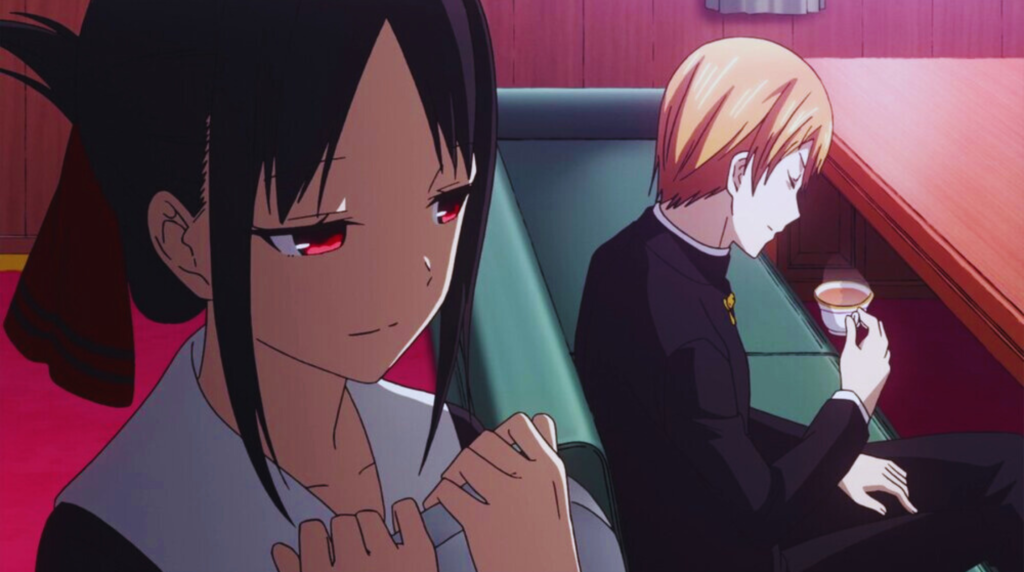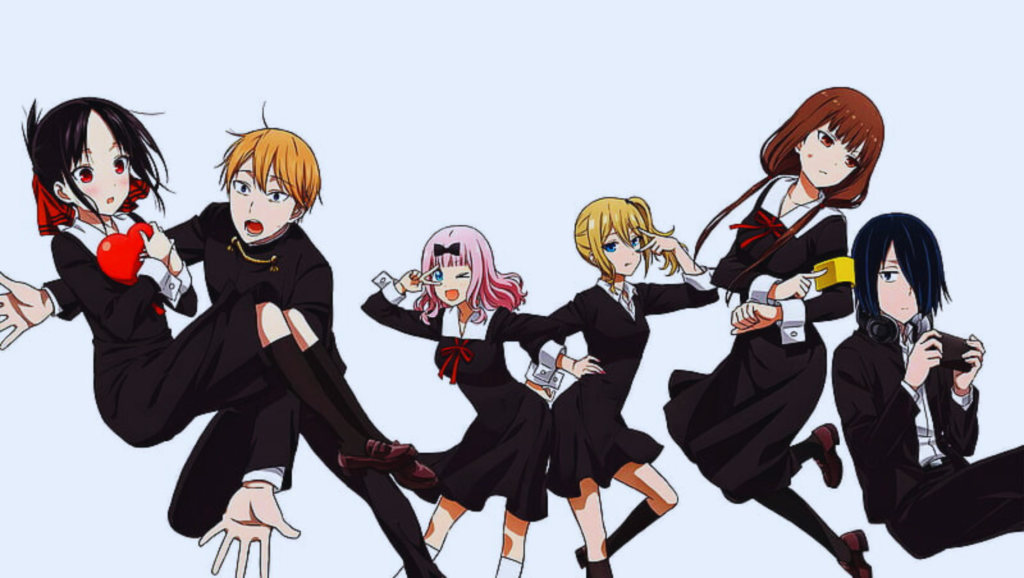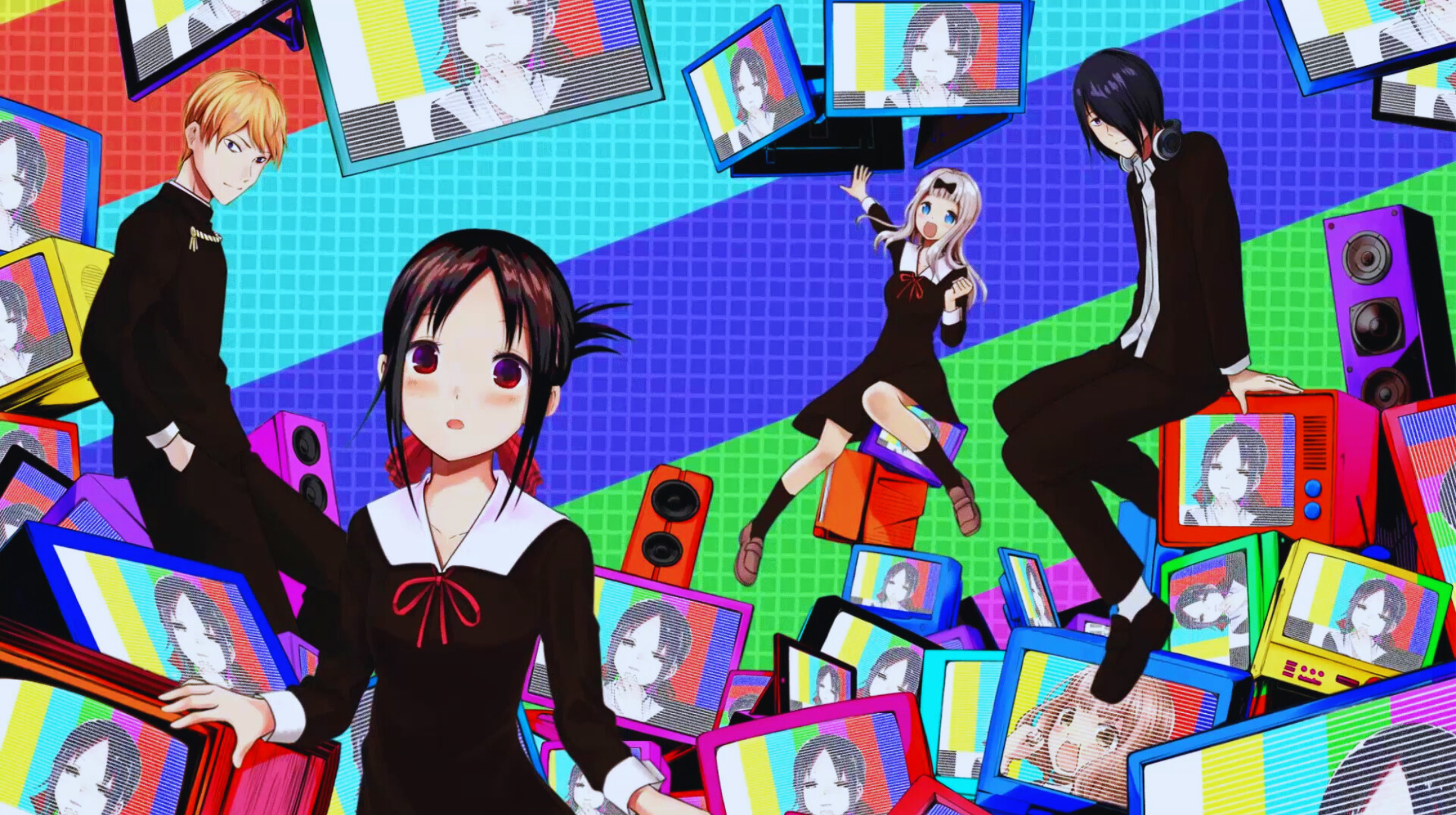Introduction
“Kaguya-sama: Love is War” is an anime that has captivated audiences with its unique blend of romance, comedy, and psychological warfare. Based on the manga by Aka Akasaka, the series has grown into a beloved franchise, celebrated for its clever writing, endearing characters, and intricate plot twists. The story revolves around two high school geniuses, Kaguya Shinomiya and Miyuki Shirogane, who are too proud to confess their feelings for each other and instead engage in a series of mind games to make the other one admit their love first.

The Premise (Kaguya-sama: Love is War)
Set in the prestigious Shuchiin Academy, the narrative focuses on the student council’s vice president, Kaguya Shinomiya, and president, Miyuki Shirogane. Both are at the top of their class and highly respected by their peers. Despite their mutual attraction, they view love as a battlefield where the first to confess is the loser, a sign of weakness. This leads to elaborate schemes and psychological battles, each trying to outsmart the other into confessing first.

Here is a list of the main characters in “Kaguya-sama: Love is War”:
Main Characters
- Kaguya Shinomiya
- Role: Vice President of the Student Council
- Description: Kaguya is the wealthy and intelligent daughter of the Shinomiya Group. She is highly skilled in various areas, including academics and sports. Despite her cold and calculating exterior, she has a sweet and vulnerable side that she often tries to hide. She is in love with Miyuki Shirogane but is too proud to confess her feelings.
- Miyuki Shirogane
- Role: President of the Student Council
- Description: Miyuki is the hardworking and diligent president of the student council. Coming from a humble background, he has earned his position through sheer determination and intelligence. He harbors feelings for Kaguya but, like her, is too proud to confess first. He is known for his excellent academic performance and leadership skills.
- Chika Fujiwara
- Role: Secretary of the Student Council
- Description: Chika is a cheerful and bubbly girl who often unintentionally disrupts the schemes between Kaguya and Miyuki with her carefree and innocent nature. She is musically talented and comes from a politically influential family. Her obliviousness to the tension between Kaguya and Miyuki adds much of the series’ comedic elements.
- Yu Ishigami
- Role: Treasurer of the Student Council
- Description: Yu is a somewhat gloomy and pessimistic boy who often deals with his own personal issues. Despite his dark demeanor, he is a loyal friend and a valuable member of the student council. He provides a more introspective and realistic contrast to the otherwise lighthearted nature of the series.
- Ai Hayasaka
- Role: Kaguya’s Maid and Confidante
- Description: Ai is Kaguya’s personal maid and close confidante. She is highly competent and often helps Kaguya with her schemes to make Miyuki confess. Ai has a pragmatic and no-nonsense attitude, balancing her professional duties with a deep loyalty to Kaguya.
Supporting Characters
- Nagisa Kashiwagi
- Role: Student Council Member
- Description: Nagisa is a friend of the main characters and often seeks romantic advice from them. Her relationship with her boyfriend, Tsubasa, is frequently used as a subplot in the series.
- Tsubasa Tanuma
- Role: Nagisa’s Boyfriend
- Description: Tsubasa is Nagisa’s boyfriend and is often seen seeking advice on how to navigate their relationship. He is earnest and genuinely cares for Nagisa.
- Miko Iino
- Role: Member of the Disciplinary Committee
- Description: Miko is a strict and upright member of the disciplinary committee. She has a strong sense of justice and initially has a contentious relationship with the student council members but gradually becomes more integrated into their group.
- Kei Shirogane
- Role: Miyuki’s Younger Sister
- Description: Kei is Miyuki’s younger sister. She is supportive of her brother and often provides insights into his personality and background. She has a mature and perceptive demeanor despite her young age.
- Kobachi Osaragi
- Role: Miko’s Friend
- Description: Kobachi is a close friend of Miko Iino and often provides her with support and advice. She is calm and observant, often acting as a mediator.
Other Notable Characters
- Papa Shirogane
- Role: Miyuki and Kei’s Father
- Description: He is a supportive but somewhat eccentric father who often gives Miyuki advice in his unique way.
- Papa Shinomiya
- Role: Kaguya’s Father
- Description: The head of the Shinomiya family, he is a powerful and intimidating figure who places high expectations on Kaguya.
- Kaguya’s Servants
- Description: Besides Ai Hayasaka, Kaguya has other servants who play minor roles, assisting her in various ways throughout the series.
Character Dynamics
The heart of “Kaguya-sama: Love is War” lies in its rich character dynamics. Kaguya Shinomiya is from an elite family and possesses a cold, calculating exterior, but underneath, she is naïve and yearns for genuine affection. Miyuki Shirogane, on the other hand, comes from a humble background and compensates for his insecurities with hard work and determination. Their interactions are a fascinating mix of tension and tenderness, making every encounter a thrilling spectacle.
Supporting characters add depth and humor to the series. Chika Fujiwara, the bubbly secretary, often inadvertently disrupts the intense mind games between Kaguya and Miyuki with her cheerful naivety. Yu Ishigami, the treasurer, brings a darker, more introspective tone to the group, dealing with personal issues that add a layer of realism to the otherwise light-hearted narrative. Ai Hayasaka, Kaguya’s maid and confidante, provides a grounded perspective and often assists Kaguya in her schemes, adding another dimension to the unfolding drama.
Narrative Structure
The episodic structure of “Kaguya-sama: Love is War” is one of its strongest points. Each episode is divided into short segments, each focusing on a different scheme or scenario. This format allows for a fast-paced and varied storytelling approach, keeping viewers engaged with fresh and unpredictable content. The series skillfully balances its comedic and dramatic elements, ensuring that neither overshadows the other.
The overarching plot slowly evolves with each episode, as the characters’ relationships deepen and their backstories are revealed. The show doesn’t rely solely on humor; it also explores themes of loneliness, social pressure, and the complexities of human emotions. This blend of comedy and serious undertones makes “Kaguya-sama: Love is War” a multifaceted anime that appeals to a wide audience.
Art and Animation
A-1 Pictures, the studio behind the anime adaptation, has done an exceptional job in bringing the vibrant world of Shuchiin Academy to life. The animation style is crisp and expressive, perfectly capturing the exaggerated emotions and comedic timing that are crucial to the story. The character designs stay true to the manga, with meticulous attention to detail that enhances their personalities.
The use of visual metaphors and dramatic cuts amplifies the psychological battles, adding an extra layer of depth to the mind games. For instance, scenes where the characters imagine themselves as generals on a battlefield or chess players in a strategic duel highlight the intensity of their mental skirmishes. This creative direction elevates the storytelling, making it not just a series of conversations, but a visually engaging experience.
Themes and Symbolism
“Kaguya-sama: Love is War” delves into several themes that resonate deeply with its audience. The most prominent theme is the notion of pride and vulnerability in love. Both Kaguya and Miyuki are terrified of exposing their feelings, equating it with weakness. This fear of vulnerability is something many viewers can relate to, making their struggles and growth more impactful.
Another significant theme is the societal pressure faced by high achievers. Miyuki, despite his impressive achievements, constantly fears being exposed as inadequate. Kaguya, while outwardly perfect, grapples with the expectations placed upon her by her family and society. Their internal battles add a layer of realism to the series, reminding viewers that even those who seem to have it all together face their own challenges.
The symbolism in the series is also noteworthy. The recurring motif of the moon, for instance, represents Kaguya’s longing and her feelings of isolation. The student council room itself becomes a microcosm of their world, a place where they can be themselves, away from external pressures. These symbols enrich the narrative, providing deeper insights into the characters’ psyches.
Cultural Impact and Reception
Since its debut, “Kaguya-sama: Love is War” has received widespread acclaim from both critics and fans. The series has been praised for its clever writing, character development, and unique premise. It has also won several awards, cementing its place as one of the standout romantic comedies in recent years.
The anime’s popularity has led to various adaptations and spin-offs, including live-action films and stage plays, further testament to its cultural impact. Its catchy opening and ending themes, often featuring playful and visually inventive sequences, have also gained a following, contributing to the show’s widespread appeal.

Why It Stands Out
What sets “Kaguya-sama: Love is War” apart from other romantic comedies is its blend of intellectual humor and heartfelt moments. The series doesn’t rely on typical romantic tropes; instead, it creates a fresh and engaging narrative through the strategic battles of wits. This approach not only provides endless entertainment but also allows for genuine character growth and emotional depth.
The show’s ability to balance humor with serious themes is another key factor in its success. It tackles issues like mental health, self-worth, and the pressures of adolescence with sensitivity and insight, all while maintaining a light-hearted and comedic tone. This duality makes the series relatable and thought-provoking, resonating with viewers on multiple levels.
The Future of “Kaguya-sama: Love is War”
As the manga continues to progress, fans eagerly anticipate how the story will unfold in future anime seasons. With each new chapter, Aka Akasaka continues to surprise and delight readers with unexpected twists and deeper character development. The anime adaptation has remained faithful to the source material, ensuring that future seasons will likely continue to capture the essence of the manga.
There is also excitement around potential new projects within the franchise. Given its popularity, there is always the possibility of more spin-offs or side stories exploring different aspects of the characters’ lives. These expansions could provide even more depth and enjoyment for fans, further solidifying “Kaguya-sama: Love is War” as a staple in the world of anime.
Conclusion
“Kaguya-sama: Love is War” is a brilliant example of how a simple premise can be elevated through exceptional writing, dynamic characters, and thoughtful storytelling. Its unique blend of romance, comedy, and psychological warfare has created a rich and engaging narrative that resonates with a broad audience. The series’ success lies in its ability to balance humor with heartfelt moments, providing both entertainment and emotional depth.
As the story of Kaguya and Miyuki continues to unfold, fans remain captivated by their intricate dance of love and wits. Whether you’re drawn to the clever mind games, the endearing character interactions, or the underlying themes of vulnerability and societal pressure, “Kaguya-sama: Love is War” offers something for everyone. It’s a testament to the power of storytelling and a reminder that love, in all its forms, is a battlefield worth fighting for.
If you enjoy “Kaguya-sama: Love is War,” here are five animes with similar themes of romance, comedy, and clever character dynamics that you might find equally entertaining:
- “My Teen Romantic Comedy SNAFU” (Yahari Ore no Seishun Love Comedy wa Machigatteiru)
- Premise: The story revolves around Hachiman Hikigaya, a cynical high school student with a pessimistic outlook on life, who is forced to join the Service Club. Alongside Yukino Yukinoshita and Yui Yuigahama, he helps other students with their problems while navigating the complexities of teenage relationships and self-discovery.
- Similarities: Both series feature clever dialogue, character-driven humor, and deep explorations of social dynamics and relationships within a high school setting.
- “Toradora!”
- Premise: This anime follows Ryuuji Takasu, a kind-hearted high school student with an intimidating face, and Taiga Aisaka, a small but fierce girl. The two form an unlikely alliance to help each other pursue their respective crushes, leading to unexpected developments and a deeper understanding of each other’s personalities.
- Similarities: “Toradora!” combines romance and comedy with well-developed characters and a focus on the emotional growth and relationships between the main characters.
- “Monthly Girls’ Nozaki-kun” (Gekkan Shoujo Nozaki-kun)
- Premise: Chiyo Sakura confesses her love to her classmate Umetarou Nozaki, only to discover that he is a shoujo manga artist. Mistaking her confession for a request for his autograph, Nozaki recruits Chiyo as his manga assistant. The series follows their humorous and quirky interactions with their eccentric friends.
- Similarities: Like “Kaguya-sama,” this anime features comedic misunderstandings and endearing character interactions set against the backdrop of high school life.
- “Ouran High School Host Club” (Ouran Koukou Host Club)
- Premise: Haruhi Fujioka, a scholarship student at the prestigious Ouran Academy, accidentally breaks an expensive vase belonging to the Host Club. To repay her debt, she must work as a host, despite being mistaken for a boy. The series follows her interactions with the eccentric members of the Host Club.
- Similarities: Both series offer a mix of romance and comedy with a focus on the antics and relationships of a close-knit group of high school students.
- “Love, Chunibyo & Other Delusions” (Chuunibyou demo Koi ga Shitai!)
- Premise: The story centers on Yuuta Togashi, a high school student who wants to leave his embarrassing “chunibyo” (middle school delusions) phase behind. However, he encounters Rikka Takanashi, a girl who still believes in these fantasies, and their interactions lead to a heartwarming and humorous journey of self-acceptance and love.
- Similarities: Both shows explore the themes of young love and the awkwardness of teenage years with a blend of comedy and heartfelt moments, featuring quirky characters and their unique worldviews.
Here are 10 frequently asked questions (FAQs) about the anime “Kaguya-sama: Love is War”:
- What is “Kaguya-sama: Love is War” about?
- “Kaguya-sama: Love is War” follows the story of Kaguya Shinomiya and Miyuki Shirogane, two top students at Shuchiin Academy who are secretly in love with each other but are too proud to confess. They engage in psychological battles to force the other to confess first.
- Who created “Kaguya-sama: Love is War”?
- The series was created by Aka Akasaka. It started as a manga before being adapted into an anime.
- When did the “Kaguya-sama: Love is War” anime first premiere?
- The anime first premiered on January 12, 2019.
- How many seasons of “Kaguya-sama: Love is War” are there?
- As of now, there are three seasons, with the third season, “Kaguya-sama: Love is War – Ultra Romantic,” airing in 2022. A fourth season or more content is highly anticipated by fans.
- What genre does “Kaguya-sama: Love is War” belong to?
- The series belongs to the genres of romantic comedy and psychological warfare.
- Who are the main characters in “Kaguya-sama: Love is War”?
- The main characters are Kaguya Shinomiya, the vice president of the student council, and Miyuki Shirogane, the president of the student council. Key supporting characters include Chika Fujiwara, Yu Ishigami, and Ai Hayasaka.
- Is “Kaguya-sama: Love is War” available in English?
- Yes, both the manga and anime are available in English. The anime is available on streaming platforms such as Crunchyroll and Funimation.
- What makes “Kaguya-sama: Love is War” unique?
- The series is unique due to its combination of romance and psychological warfare, where the main characters use their intelligence and wit to try to outsmart each other instead of directly confessing their love.
- Are there any live-action adaptations of “Kaguya-sama: Love is War”?
- Yes, there are live-action film adaptations of the series. The first film was released in 2019, and a sequel followed in 2021.
- What are some common themes explored in “Kaguya-sama: Love is War”?
- The series explores themes such as pride and vulnerability in love, the pressures of high achievement, loneliness, and the complexity of human emotions and relationships. These themes are woven into the comedic and strategic battles between the characters.


1 thought on “Kaguya-sama: Love is War (2019) – An Intricate Dance of Love and Wits”